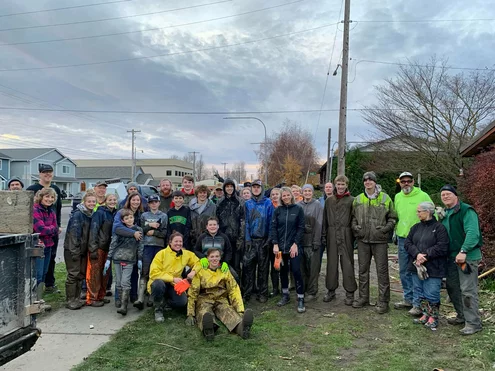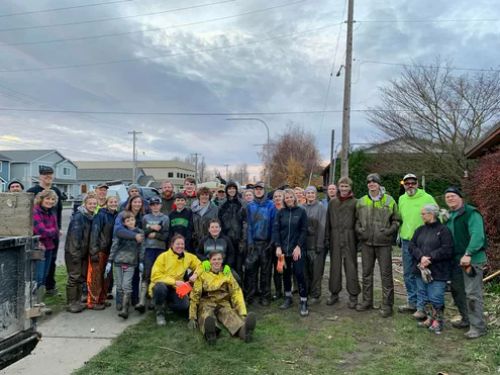 It all started when a torrential rainstorm river began to flow into the Pacific Northwest. Several days of rain, not the usual heavy mist known in the Northwest, poured into the rivers, flatlands, and streams all around us. The smaller communities of Sumas, Nooksack, Everson, Ferndale, and to a lesser extent, Lynden where we call our home, were affected and a disaster occurred. Many had to leave their flooded homes at a moment's notice with only the clothes on their backs and a few personal items. Not only homes and apartments, but churches, schools, and businesses were damaged as floodwaters poured into them from rapidly rising rivers and heavy rains that continued over several days.
It all started when a torrential rainstorm river began to flow into the Pacific Northwest. Several days of rain, not the usual heavy mist known in the Northwest, poured into the rivers, flatlands, and streams all around us. The smaller communities of Sumas, Nooksack, Everson, Ferndale, and to a lesser extent, Lynden where we call our home, were affected and a disaster occurred. Many had to leave their flooded homes at a moment's notice with only the clothes on their backs and a few personal items. Not only homes and apartments, but churches, schools, and businesses were damaged as floodwaters poured into them from rapidly rising rivers and heavy rains that continued over several days.
Maybe you've never had to experience that kind of disaster. In our thirteen years here we haven't either, until now. What would be your response? What would be the response of your church? In our community, individuals and churches stepped up and responded.
Two of the larger churches in Lynden offered their facilities as sites where people who had to evacuate could stay. Samaritan's Purse, a branch of the Billy Graham Evangelistic Association, brought in a response team including volunteer workers and chaplains, who are still hard at work after several days. Churches around our county mobilized to provide clothing and household supply donation centers and volunteer workers. The picture above is of some 34 workers from my church who volunteered to help clean out crawl spaces in flood-damaged houses, a very dirty and wet job. Prayers continue to be offered. Pickups and trailers are being seen driving through communities as volunteers pick up damaged goods including wet walls and water-soaked appliances and furniture. Financial gifts are being given by church members from all over our county.
When disaster strikes, the church mobilizes and meets needs. That's just what the church is commanded and equipped to do – love your neighbor as yourself.
Here are some ideas of what your church and you can do if you ever find yourself in a disaster zone.
What can you do?
First and foremost, pray. Pray for the families and businesses affected. Ask God to show you how you and your family might be able to help bear one another's burdens and so fulfill the law of Christ.
Volunteer to do what you can do. Not everyone can help clean out damp and dark crawl spaces or help move damaged appliances or appliances, but you can do something. Maybe it's as simple as serving in a food line or babysitting for an hour or two. Whatever it is, do it for the glory of God.
Help your church coordinate or give leadership to volunteer sign-up sheets, a food or clothes closet, or other ministries that are needed in your community.
If you have a place in your home where local refugees can stay for a period of time, let it be known that you can take in a family until they can get back on their feet. Exercise biblical hospitality with the love of Jesus.
Give to a credible and trusted agency that provides help such as your church, Samaritans Purse, the Salvation Army, or other organizations if it is involved in serving your community's needs.
If you have children or teens in your home, get them involved in what you are led to do in ministering to the needs of needy people in your community.
What can your church do?
Attend or lead special prayer meetings for your community. Get out of your comfort zone and invite others to join you in prayer. Pray for those who are affected, but don't forget to pray for the volunteer cleanup people and the chaplains and workers from outside your community.
Ask your church leaders to set up a special benevolence fund that will be devoted to the disaster needs of your community.
Organize or participate in a workgroup from your church that will help those affected by the disaster. Find out from the church office or pastor those from your church who have been affected and prioritize them, especially if they are widows or single-parent families. Recognize those who volunteer from your church as short-term missionaries and pray for them in worship services.
Encourage your church leadership to invite a congregation that has had to suspend worship services to join your services until it is able to get back into its own building. Provide space and time for them if they prefer to meet in your church facilities on their own.
What would you suggest?
Here are some guiding words from the God of mercy and compassion:
"You shall love your neighbor as yourself" (Matt. 22:39b).
"Bear one another burdens, and so fulfill the law of Christ" (Gal. 6:2).
"But a Samaritan, as he journeyed, came to where he was, and when he saw him, he had compassion. He went to him and bound up his wounds, pouring on oil and wine. Then he set him on his own animal and brought him to an inn and took care of him" (Luke 10:33-34).
"When he saw the crowds, he had compassion for them, because they were harassed and helpless, like sheep without a shepherd. Then he said to his disciples, 'The harvest is plentiful, but the laborers are few; therefore pray earnestly to the Lord of the harvest to send out laborers into his harvest' " (Matt. 9:36-38).

